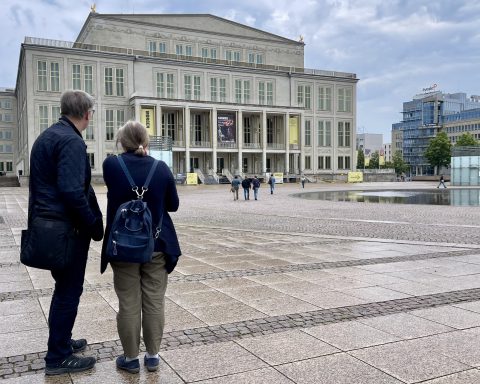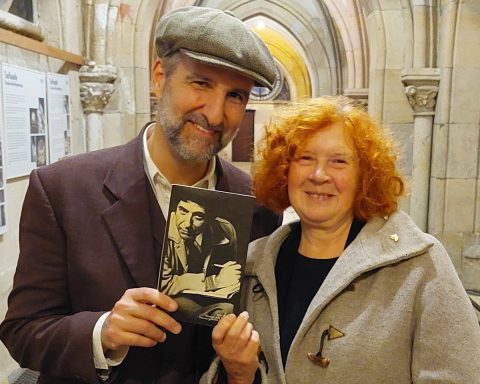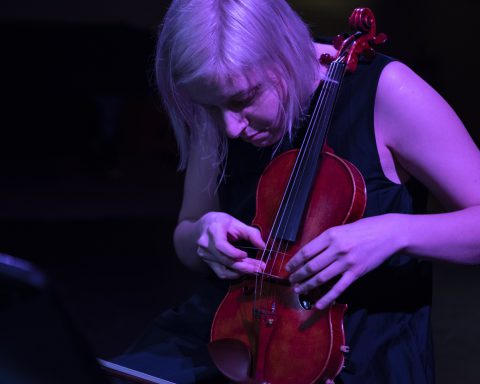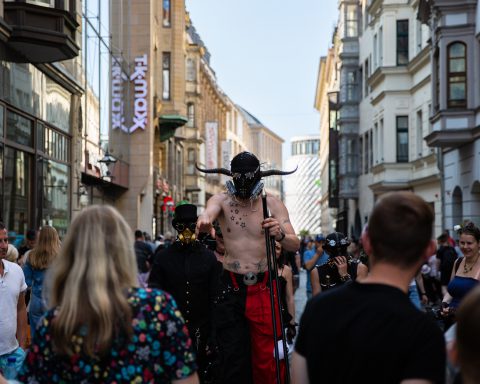Are you afraid of spiders? Is it merited or have they been (unfairly) vilified in fairy tales, like foxes and wolves? The Secret of the Black Spider may reveal more than expected.
My favorite children’s story about a spider is about a poignant friendship between an innocent farm pig named Wilbur and spider named Charlotte. Written by beloved children’s author E.B. White, it is set in America’s heartland (where I originally hail from). The tale overflows with themes of innocence, loyalty, change, the cycle of life.
I give it sole credit for my life-long healthy respect of spiders. I have one camped out now in the corner of my bedroom. It’s keeping me from being eaten alive this summer while I slumber.
The children’s opera The Secret of the Black Spider is no Charlotte’s Web, though.
Its first incarnation was as an 1842 novel called The Black Spider, written by Swiss writer Jeremias Gotthelf. The Christian vs Humanist novel is an endlessly frightening, tragic, allegorical tale involving an idyllic, medieval Polish village. The village has been struck by a generations-long curse delivered by the spurned devil via the bite of a spider. In 1984, Scottish composer Judith Weir adapted the novel as a young people’s opera.
Its world premiere was fittingly performed in the crypt of Canterbury Cathedral. Weir’s version was expanded in 2009 by American composer Benjamin Gordon, commissioned by the Hamburg State Opera. It is this wider orchestration that we are treated to in the Oper Leipzig production, deftly directed by Philipp J. Neumann, who also serves as stage director. The dramaturgy is by Elisabeth Kühne.
The Schaubühne Lindenfels is the perfect venue for this Black Spider production.
Even the balcony is used. The opera shuttles between Poland in the Middle Ages and contemporary times. As we are seated, we lay our eyes on the huge sarcophagus at the back of the stage. It sets the foreboding tone for the whole play.

The opera’s storyline switches between archaeologists trying to figure out what exactly caused the death of their colleague and the medieval village’s story. In Poland in the year 1500, the villagers are attempting to follow the orders of the cruel Count Heinrich, played effectively by Adele Bauer.
The task of hauling an entire forest of beech trees up the mountaintop to plant near his house is too great for them. So when a mysterious hunter in green (the devil) shows up, they readily accept his help.
His price is the hand of a village girl, Christine. Despite being betrothed to her true love, Carl, she breaks off her engagement and agrees to marry the Green Hunter. She breaks her promise. After the deed is done, she marries Carl as planned.
As a result, the Green Hunter unleashes the spider upon the village. It crawls out of Christine’s hand and is manifested in this production as a large red and black projection. Consequently, a plague spreads throughout the village.

The notes state that The Secret of the Black Spider is for children 10 and over.
I admit that, after perusing the original, dark, gruesome and tragic story it is based on, I had some apprehensions on how exactly this was going to be managed. Be assured that it is just the right age-appropriate scary. Children were even standing in their seats to “look for the spider” whenever it “appeared” in the play without the projection.
Light floods the stage in changing colours that express the various moods. In addition, the musical director, Sophie Bauer, elicits professional and energetic performances out of the youth choir – with the assistance of Maria Hinze, Nicole Roesler and Alice Ungerer. Particularly noteworthy is Helen Fekade’s Christine.
Helen Fekade is a sympathetic actress who sings with clarity and passion.
Lena Hunter sings the Green Hunter. It’s a role that could easily be overacted, but she plays it with admirable understated menace. We even had comic relief in the form of the contemporary day Pathologist, who examines the corpse of the dead archaeologist. He’s played sprightly and enthusiastically by Georg Helm, who scurries around delightfully on the upper levels of the hall during the course of his investigations.
The rest of the main ensemble – including Marius Harold as Carl, Philin Pernak as Herold, Julika Modro as the priest, and Sofiya Kulay and Clara Tutschkus as Christine’s friends – are also impressive and sing with high quality. Special mention on this night should also go to Paulina Nepp, who sang the little dancer, Caprice with, well… caprice and whimsy.
I thoroughly enjoyed the vibrant performances of the entire choir. They looked like they were having fun in their lovely costumes by Nicola Minssen. That is, after all, most important.
An observation:
There were times when the children were gathered behind the stage and I could not hear clearly what was happening on the stage. This was most obvious before the very first act.
Perhaps the children could gather and quieten before the opera opens, rather than during the opening. It was a bit distracting and lessened the impact of the first scene – which was the first scene with the sarcophagus in present day.
The other observation was that I didn’t really find the score or lyrics all that remarkable – in that I wasn’t humming anything as I left the theatre. However, this did not at all detract from the performances.
Furthermore, the MuKo orchestra under Bauer made the most of all the beats and flourishes, which of course, included all the apropos scary cello bits.
I highly recommend The Secret of the Black Spider. Fun and scary, kids will find it highly entertaining and adults will certainly not miss the references to our world situation today – nor will they find it boring!
The Secret of the Black Spider will be back at Schaubühne Lindenfels in June 2019.
Feature photo: The Secret of the Black Spider, Green Hunter (Lina Daniel), Christine (Helen Fekade) © Kirsten Nijhof








